 4 citations,
January 2016 in “International journal of reproduction, contraception, obstetrics and gynecology”
4 citations,
January 2016 in “International journal of reproduction, contraception, obstetrics and gynecology” A certain genetic variation is linked to a higher risk of polycystic ovarian syndrome.
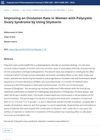 3 citations,
March 2017 in “Iraqi Journal of Pharmaceutical Sciences”
3 citations,
March 2017 in “Iraqi Journal of Pharmaceutical Sciences” Silymarin and metformin together most improved hormone levels and ovulation in women with PCOS.
 3 citations,
December 2016 in “PubMed”
3 citations,
December 2016 in “PubMed” Menstrual abnormalities in PCOS women may not greatly affect their metabolic and hormonal profile.
3 citations,
December 2014 in “Elsevier eBooks” Male hormones and their interactions are crucial for male sexual development and characteristics.
 3 citations,
January 2018 in “International Journal of Advances in Medicine”
3 citations,
January 2018 in “International Journal of Advances in Medicine” The most common skin problems in polycystic ovarian disease are hirsutism and acne, and managing these symptoms is key for treatment.
 2 citations,
December 2021 in “Cureus”
2 citations,
December 2021 in “Cureus” Most women with Polycystic Ovary Syndrome (PCOS) have skin issues like excessive hair, acne, or hair loss. Hormone imbalances are common, and age, certain hormones, and hormone ratios can predict acne. Obesity, infertility, and high cholesterol are also common in these women.
2 citations,
November 2020 in “Journal of Nepal Medical Association” PCOS is often linked with menstrual issues, hormonal imbalances, and a higher risk of heart disease and diabetes.
2 citations,
January 2017 in “Iraqi journal of medical sciences” Obese women with PCOS have lower zinc levels than non-obese ones.
 2 citations,
January 1986 in “Dermatology”
2 citations,
January 1986 in “Dermatology” A woman with Kallman's syndrome also developed alopecia universalis, a condition not previously linked to Kallman's.
 1 citations,
May 2023 in “Fertility and sterility”
1 citations,
May 2023 in “Fertility and sterility” Men who went through puberty later had lower sperm counts and altered hormone levels, possibly affecting fertility.
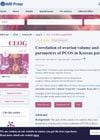 1 citations,
March 2022 in “Clinical and Experimental Obstetrics & Gynecology”
1 citations,
March 2022 in “Clinical and Experimental Obstetrics & Gynecology” Ovarian volume is significantly related to higher levels of certain hormones in Korean women with PCOS.
 1 citations,
September 2019 in “Steroids”
1 citations,
September 2019 in “Steroids” Two new mutations in the AR gene linked to severe androgen insensitivity were found.
 1 citations,
October 2018 in “International Journal of Research in Dermatology”
1 citations,
October 2018 in “International Journal of Research in Dermatology” Most women with excessive hair growth in South India have hirsutism without a known cause, with common facial hair growth and some showing hormonal imbalances and polycystic ovaries.
 1 citations,
January 2017 in “International journal of women's health and reproduction sciences”
1 citations,
January 2017 in “International journal of women's health and reproduction sciences” Electroacupuncture improved symptoms of PCOS in a 19-year-old woman.
 1 citations,
January 2016 in “International journal of reproduction, contraception, obstetrics and gynecology”
1 citations,
January 2016 in “International journal of reproduction, contraception, obstetrics and gynecology” Hypothyroidism may worsen metabolic problems like insulin resistance and obesity in women with PCOS.
 1 citations,
October 2013 in “Journal of Postgraduate Medical Institute”
1 citations,
October 2013 in “Journal of Postgraduate Medical Institute” Metformin helps improve menstrual irregularities and some hormone levels in PCOS patients, but not symptoms like excess hair, acne, or hair loss.
 1 citations,
June 2023 in “Reproduction”
1 citations,
June 2023 in “Reproduction” Microglia, the brain's immune cells, may contribute to Polycystic Ovary Syndrome (PCOS) by altering the female brain's structure and function, with kisspeptin neurons and GABA neurotransmitters also playing a role.
 1 citations,
January 2020
1 citations,
January 2020 AMH levels in adolescents with PCOS are not affected by their weight.
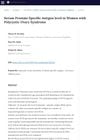 1 citations,
July 2016 in “Mağallaẗ Kulliyyaẗ al-ṭibb Baġdād”
1 citations,
July 2016 in “Mağallaẗ Kulliyyaẗ al-ṭibb Baġdād” Women with PCOS have higher PSA levels, which are linked to increased male hormone levels and hirsutism.
 1 citations,
January 2013 in “MedChemComm”
1 citations,
January 2013 in “MedChemComm” PF-05314882 selectively activates androgen receptors without much effect on prostate and may help in prostate cancer treatment and hair loss prevention.
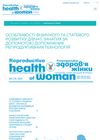 July 2024 in “Reproductive health of woman”
July 2024 in “Reproductive health of woman” Girls conceived via assisted reproductive technologies show early puberty signs and larger ovaries.
 May 2024 in “Journal of drug delivery and therapeutics”
May 2024 in “Journal of drug delivery and therapeutics” Women with PCOS have higher oxidative stress and hormone imbalances, suggesting managing oxidative stress could help.
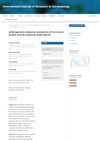 December 2023 in “International Journal of Research in Dermatology”
December 2023 in “International Journal of Research in Dermatology” Hormonal imbalances are important in the development of male pattern baldness.
 October 2023 in “IJEM case reports”
October 2023 in “IJEM case reports” A 15-year-old girl with no menstrual period was diagnosed with a genetic condition that makes her body unable to respond to male hormones, leading to female characteristics despite having male genetic makeup.
 September 2023 in “Research Square (Research Square)”
September 2023 in “Research Square (Research Square)” Evening primrose oil significantly improves hormone levels and reduces BMI and cholesterol in women with PCOS.
 September 2023 in “Deleted Journal”
September 2023 in “Deleted Journal” Lifestyle changes improve reproductive function and hormonal balance in obese women with PCOS.
 August 2023 in “Journal of Clinical Medicine”
August 2023 in “Journal of Clinical Medicine” Metformin lowers prolactin in women without PCOS but not in those with PCOS, where it reduces other hormones instead.
 May 2023 in “Animal Reproduction Update”
May 2023 in “Animal Reproduction Update” High levels of cortisol in hair show long-term stress which can lower fertility in animals.
 January 2023 in “International journal of medical science and health research”
January 2023 in “International journal of medical science and health research” Anovulatory PCOS patients are younger with longer cycles and higher blood pressure and hormone levels.
 January 2023 in “Advances in reproductive sciences”
January 2023 in “Advances in reproductive sciences” Higher levels of the protein Pannexin-1 may play a role in hair loss in women with PCOS.



























